B'nai Spotlight - Debuskey and Blaustein Families

Charles Debuskey, (on left) immigrant ancestor of the Debuskey family in Baltimore and his son Robert Mendel Debuskey (on right). (photos from B'nai Israel Congregation's 1948 Diamond Jubilee program book.)
A 1914 Baltimore City directory lists “Blaustein Nathan & Co,”, a grocery, as being run by “Nathan Blaustein, Robt M Debuskey, and Frank Blaustein”. The store was at 1513 Gough. The directory links two family names important in B’nai Israel’s history - Debuskey and Blaustein.
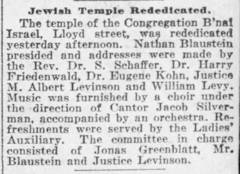 Nathan Blaustein presided over the 1915 re-dedication of the "temple of the Congregation B'nai Israel" (see image to the left), and served as toastmaster for a 3 February 1913
Nathan Blaustein presided over the 1915 re-dedication of the "temple of the Congregation B'nai Israel" (see image to the left), and served as toastmaster for a 3 February 1913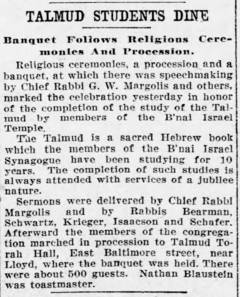 siyum marking the completion of studying the Talmud for ten years (see image to the right).
siyum marking the completion of studying the Talmud for ten years (see image to the right).
Nathan's wife, Dora Kahn, was the first president of the woman's auxilary at B'nai Israel, established in 1912.
Nathan was the brother of Louis Blaustein, the founder of the American Oil Company. Today, the Jacob and Hilda Blaustein Fund of The Associated, founded by Louis'son, is the key financial supporter of our Descendants’ Day program.
The Debuskey family would contribute several leading figures to early B’nai Israel leadership. Robert Debuskey was a president of B’nai Israel and his name can be found on the 1913 synagogue constitution. His father Charles, who was the first Debuskey to arrive in the United States served as a Vice-President of B’nai Israel. Debuskey names appear in a variety of B’nai Israel historical documents. For example, Mary Debuskey, Matityahu Debuskey (the father of Charles, the immigrant Debuskey), and Robert Debuskey's names are listed on the Talmud Yahrzeit Board.
The story is, in many ways, a story common among Jewish families immigrating to cities in the United States. Using a variety of skills and starting a variety of businesses they became part of the fabric of commercial life in the city and established the institutions that allowed Jewish communities to thrive - in this case, B’nai Israel Congregation.
Charles Debuskey came to the United States around 1877. His wife Mary (Simon) and their infant daughter Fannie followed a couple of years later.
In A History of the B’nai Israel Congregation of Baltimore City, Fred Shoken points out the central role Harrison Street played in the early Jewish community and specifically in the formation of B’nai Israel. Several of the founders of B’nai Israel lived on Harrison Street. Harrison Street no longer exists, but it was on the west bank of the Jones Falls near the Shot Tower and where the Jones Fall Expressway and the police headquarters are now located. This area had been developed commercially and residentially in the late 18th century after Harrison’s Marsh was filled in.
Charles Debuskey was part of this Harrison Street community. By the 1890s, Charles was working as a butcher on Harrison Street and the family had grown by four: Robert, Jacob, Joseph, and Aaron, born in 1880, 1881, 1885, and 1886, respectively. The youngest son, Aaron, died in 1889 at the age of 3 and was buried in the old section of the B’nai Israel Cemetery.
By 1900, Charles, now living with the family at 209 Harrison Street, was a naturalized U.S. citizen. The 1905 Baltimore City directory and the 1910 census show that Charles continued his occupation as a butcher. Of Charles and Mary’s sons, Jacob was at this point a cutter, Joseph was a bookkeeper, and Robert was employed by Robinson Valenstein and Company.
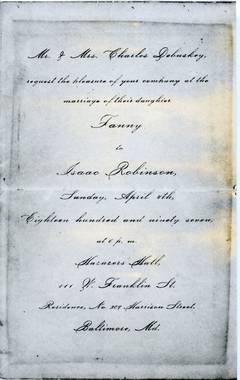 Their daughter Fannie, having married Isaac Robinson three years earlier, was now living
Their daughter Fannie, having married Isaac Robinson three years earlier, was now living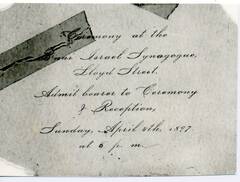 with Isaac and their two young children Ruth and Hilda at 1106 E. Fayette Street. The invitation to their April 4th 1897 wedding can be seen to the left and the admittance ticket to the right (both courtesy of the Jewish Museum of Maryland). In the next decade, four more children joined their family: Morton, Myrtle, Zelda, and Aaron. By 1920, Isaac and Fannie were living with all nine of their children, having added Jerome, Charles, and Marshall to their family, and already left the neighborhood and moved to Reservoir Hill in West Baltimore.
with Isaac and their two young children Ruth and Hilda at 1106 E. Fayette Street. The invitation to their April 4th 1897 wedding can be seen to the left and the admittance ticket to the right (both courtesy of the Jewish Museum of Maryland). In the next decade, four more children joined their family: Morton, Myrtle, Zelda, and Aaron. By 1920, Isaac and Fannie were living with all nine of their children, having added Jerome, Charles, and Marshall to their family, and already left the neighborhood and moved to Reservoir Hill in West Baltimore.
Charles and Mary’s two older sons married prior to 1910, with Robert marrying Freda Blaustein around 1906 and Jacob marrying his first wife, Sarah, around 1903. By 1910, Robert and Freda had their first child, Matthew, and were living at 24 N. Montford Avenue. Nathan Blaustein & Co had come into existence by this time as the census shows Robert working as a grocer. At the same time, Jacob and Sarah were living on Fremont Avenue, with Jacob working as a cutter in the clothing industry.
Charles died in May 1911 and was buried in the B’nai Israel Cemetery.
Around 1912, Charles and Mary’s remaining son, Joseph, married Fanny Blaustein, none other than the sister of his brother Robert’s wife Freda. Joseph and Fanny had two children, Charlotte and Charles, in 1916 and 1921, respectively. In the same period, Robert and Freda had four more children, Charles, Shirley, Franklin, and Basil.
Mary died in 1922 and was buried in the B’nai Israel Cemetery alongside Charles. They were eventually joined by all of their children, and nearly all of their grandchildren.
Another son, Basil (pictured to the right), who went by his middle name Merle, was well known in the New York world of theater. Upon Merle’s death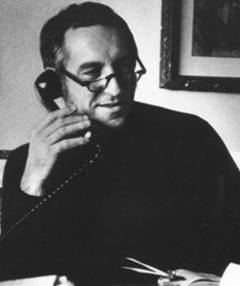 at the age of 95 in 2018, the New York Times published a lengthy obituary. According to that obituary, apparently, Baltimore lost Merle to New York because The Sun rejected him for a job as a journalist. It is in another obituary for Merle that the family connection to Louis Blaustein is mentioned.
at the age of 95 in 2018, the New York Times published a lengthy obituary. According to that obituary, apparently, Baltimore lost Merle to New York because The Sun rejected him for a job as a journalist. It is in another obituary for Merle that the family connection to Louis Blaustein is mentioned.
Merle’s mother Freda and her sister Fanny, were two of the eleven children of Louis’ brother, Nathan, and his wife, Dora (Kahn) Blaustein. Along with Freda and Fanny, Nathan, Dora, and three more of their children’s graves can be found in the B’nai Israel Cemetery.
As an interesting aside related to interconnected families, Louis and Nathan Blaustein had (among other siblings) a brother named Samuel, who was the father of Ida, the mother of longtime B'nai Israel member Gil Barron. You can read more about Gil Barron here.
Nathan first came to the U.S. around 1891. His wife Dora followed soon after with their six older children: Frank, Lewis, Freda, Joseph, Fanny, and Samuel. Their five younger children, Ida, Golda, Harry, Miriam, and Mildred, were born in Baltimore.
Nathan owned a grocery store in Baltimore - the Nathan Blaustein & Co store mentioned earlier at 1513 Gough Street. He applied for a patent relating to the sale of tea in June 1910, according to the Official Gazette of the US Patent Office. Robert (Mendel) Debuskey, Nathan’s grandson, seems to have at least partially taken over running the store by 1917, when “Nathan Blaustein & Co.” joined the National Association of Credit Men with Robert as its representative. Robert's World War I Draft Registration Card indicates that he was General Manager of the store by September 1918. Nathan’s son, Robert’s uncle, Frank Blaustein, was also involved in the running of the grocery before his death in 1916.
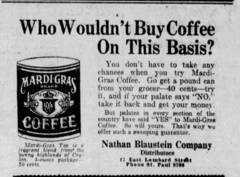 By 1921 that store had moved from Gough Street to 17 E. Lombard Street, as evidenced by newspaper ads of the time.
By 1921 that store had moved from Gough Street to 17 E. Lombard Street, as evidenced by newspaper ads of the time.
Also as indicated in various help wanted clippings from The Baltimore Sun, such as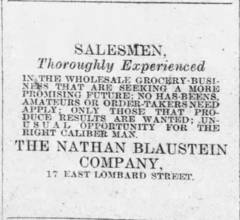 this 24 January 1922 clipping to the right. And their standards were very specific - “No has-beens” for instance.
this 24 January 1922 clipping to the right. And their standards were very specific - “No has-beens” for instance.
The grocery store closed later in 1922. Robert Debuskey would become an insurance broker and salesman, and the family would move to West Baltimore as documented by the 1930 and 1940 censuses, and his World War II Draft Registration Card. In fact, throughout the late 1920s through the 1940s most of the Debuskey and Blaustein families scattered beyond the southeast Baltimore Jewish community, with many moving to west Baltimore and others out-of-state. At some time Robert would become a wine salesman, and it is in that role that he appears in the New York Times obituary for his son, Merle.
The origins of B’nai Israel is a story of families forming new communities and community institutions in a new land. Part of that process are families with new neighbors intermarrying and forging new bonds of kinship that lay at the foundation of businesses, synagogues, and other institutions of that community. This is just one of those stories.
